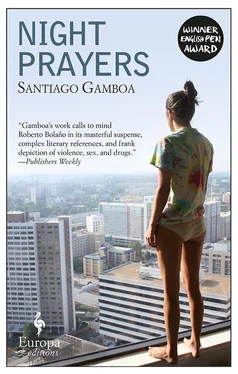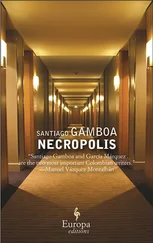The ambassador’s wife was equally enchanting. She worked for the Department of Foreign Studies at the University of Tehran and immediately suggested I give a few lectures about Latin America. I could even come back and give a course now that a faculty of Latin American Studies was about to open. We had empanadas, delicious meat, and wine, and got back to the hotel just before midnight. Our mobile consulate would be opening at eight the following morning, and we needed to rest.
Back at the hotel I started thinking about Juana again. What ideas were crossing her mind now that she was so close to her brother? so close to fleeing Iran? I imagined her looking at it all with the eyes of someone looking at the things they are about to leave, which in her case included her husband: fearful eyes, anticipating homesickness; proud eyes, almost wild at the thought of what she is about to do, aware of what it will cost other people; hungry eyes that want to devour everything, swallow it up; predatory eyes that bite and don’t care about the blood. What had her life been like? and above all, the strangest, hardest thing to justify, the thing that kept hitting my brain over and over like a drop of water (that old Chinese torture): why had she never tried to get in touch with Manuel?
One word from her, and none of this would have happened.
The following day, at eight-thirty in the morning, those members of the Colombian community with procedures pending started to arrive. Olympia sat with the second secretary in what would become the dining room, and I sat at a small desk behind a staircase. The only problem we had — and it was one that almost drove us to distraction — was getting hold of an electric typewriter to fill in the passports. A typewriter that was big enough to allow the books to pass through the roller and that also had an corrector; being an antiquated machine you couldn’t use Tippex (I’d used Tippex when I wrote my first novel, typed on a Remington portable, and I remembered how it stayed on my fingers). In the end, the Cuban Embassy lent us one, which arrived just in time!
Most of those who came were women and, I have to say, almost all of them were very attractive. Apart from my own experience in Japan, I remembered what Olympia had told me about the Tokyo-Tehran connection. In the light of that, Juana’s case was just one among many.
Every time the bell rang and the secretary of the embassy opened the door, I imagined Juana coming into the room. But she didn’t. Even though I had her number, I preferred not to call her in order not to arouse suspicion. She must have had to invent an alibi to come. I continued waiting.
By three in the afternoon I had signed — and done by hand, with Mauricio and Olympia — twenty-two passports, sixteen birth certificates, and nine wedding certificates. Some of the Colombian women came with their husbands to ask for visas, but this was one of the few procedures we couldn’t do, because Iran was on the list of countries for which the Foreign Ministry obliged us to send the forms to Bogotá to be authorized. At four o’clock, we received the last forms and announced that the following day would be the deadline for applications. With that, we shut up shop for the day.
At about five the chauffeur took me to see the Grand Bazaar, one of the attractions of the city: a beautiful medieval market that at times goes underground, with winding alleyways. I bought pistachios — the best in the world — admired the pastries, the leatherwork, the many veils; just as I had in the bazaar in Damascus, I took photographs of the splendid stands selling women’s underwear (“brevity is the soul of lingerie,” who wrote that?), with their daring multicolored thongs as thin as dental floss, decorated with plastic flowers and flashing lights, corsets and panties open at the front, a whole range of models that, at least in Europe, can only be found in sex shops, which can’t help but arouse curiosity given the strict morality and Islamic modesty around women’s bodies.
Then, at seven, I went with the second secretary to the Foreign Ministry for a formal talk with the minister. His advisor for Latin America spoke excellent French and some Spanish, and the minister himself had served as ambassador in Cuba and Venezuela for ten years. Both agreed that Iran wanted closer links with our country, since they saw us as an economically prosperous area. Their friendship with Venezuela and Bolivia had opened their eyes. We returned the compliments. They insisted on their desire for Colombia to re-establish a diplomatic presence in Tehran, which it had not had since the Uribe government had severed relations in 2002. We promised to bear it in mind, ate more delicious pistachios with tea, and half an hour later were back out on the street.
That night we had dinner in a traditional restaurant: meat, kebabs, rice with saffron, mint, extraordinary flavors. It’s difficult to enjoy a dinner of that caliber without any kind of wine. Instead, we drank tea and mineral water. A little later I saw a singular spectacle, when a customer wanted to show his appreciation of the singer by offering him money. The master of ceremonies changed the sum into small notes and threw them over the singer, one by one, a shower of dinars, a colorful custom that, if any of our drug barons had seen it, would surely have become established in our country.
The following day we opened at the same hour.
The wait was a long one, but at last, about twelve, Juana appeared. She seemed unreal to me, as if looming out of a fog: an idea that materializes and takes on form and body, that emerges from a wood or a lagoon, from something symbolic, and at the same time, profoundly human. Was she beautiful? Anyone preceded by a history like hers would have been. I greeted her, holding back the emotion I felt. She was in fact very attractive. All Manuel’s words were in her: in her smile and her proud eyes, in her colossal expression of strength. She gave me a hug, then showed me her baby.
“This is Manuelito.”
Something in her expression, a certain weariness or sadness, bore witness to the blows she had received. I offered her tea. When we had moved apart from the others, I looked her in the eyes and said, have you decided? are you coming with me?
“Yes,” she replied, “everything’s ready. Is the flight on Sunday?”
I told her she could come to my hotel and we would leave from there. For obvious reasons, I didn’t put her name down as someone coming with our delegation, because that might cause diplomatic problems. But she would travel by my side. She said yes. We went to the office and she herself checked that the child’s documents were in order. Her passport had already been drawn up, as well as the birth certificate (Manuel Sayeq Hedayat Manrique). Having done this, the second secretary proceeded to remove the adhesive from the passport for the signature, but when I went to take hold of it, Juana stopped me.
“No, please, you keep them. I don’t want to take the risk of someone finding them. I’ll get to your hotel at eleven o’clock on Sunday, with everything ready. Thank you.”
I walked her to the door. She said goodbye with a sad, nervous smile. I watched her walking along the street in the direction of the avenue. Then I called my travel agent in Delhi to get his confirmation, and ordered him to send the tickets for her and the child on the same return flight that he had reserved for me. Foreseeing this situation, I had taken a return for Sunday, whereas Olympia and the second secretary were going back on Saturday. I trusted them completely, but I preferred not to have witnesses.
On the day of the flight, Juana arrived at the specified hour, with two small suitcases. Manuel Sayeq was asleep in her arms. She seemed nervous, but her eyes were hard and determined. She had swum in difficult waters, cold and deep; she was used to making definitive and even cruel decisions. I omitted to ask about her husband or to mention her life in Iran, the life she was on the point of abandoning. Now was not the time.
Читать дальше












